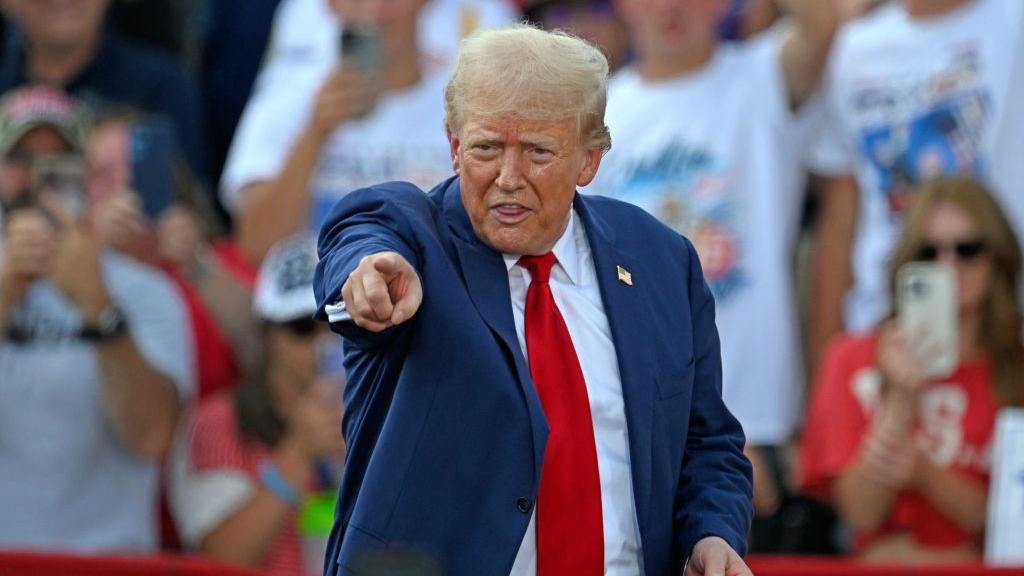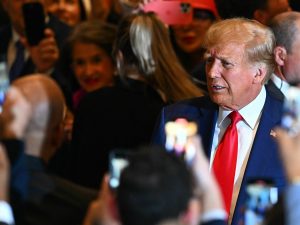Trump Struggles to Stay On Message Amid DNC Criticism
3 min read

Donald Trump may not be physically present in Chicago, but his influence is palpable, and he is closely monitoring the Democratic National Convention (DNC) from afar. Despite claims from some aides that Trump is avoiding the convention because he views it as a mere “infomercial,” a senior campaign official has confirmed that he is indeed watching and is visibly frustrated by the attacks being directed at him.
According to a confidant who regularly communicates with Trump, the former president would be best positioned to win in November if he focuses on discussing the economy, border security, and crime. At the beginning of the week, this strategy seemed feasible. Trump had planned a series of rallies in key states like Pennsylvania, Michigan, North Carolina, and Arizona, each designed to emphasize these critical issues.
However, the relentless stream of anti-Trump rhetoric at the convention has derailed this approach. Trump’s campaign is now struggling to maintain its intended message, and this shift does not align with what his supporters desire. During a rally in North Carolina on Wednesday, Trump exhibited a classic response to the situation, turning the event into a referendum on his own campaign strategy. He questioned his audience, “They always say, ‘Sir, please stick to policy, don’t get personal’… and yet [the Democrats are] getting personal all night long. Do I still have to stick to policy?” His supporters’ enthusiastic response to his more personal approach led him to declare, “My advisers are fired!” while acknowledging that he would stick to policy but couldn’t ignore the attacks.
This dynamic has left Trump’s campaign advisers in a challenging position. Their primary concern is keeping Trump focused on policy issues rather than allowing him to engage in controversial personal attacks. The inconsistency between the candidate’s behavior and the campaign’s strategic goals complicates their efforts to present a cohesive message.
Late Wednesday night, Trump took to social media to express his dissatisfaction with Pennsylvania Governor Josh Shapiro’s speech at the DNC. Trump criticized Shapiro, saying, “The highly overrated Jewish Governor of the Great Commonwealth of Pennsylvania, Josh Shapiro, made a really bad and poorly delivered speech.” He further stated, “I have done more for Israel than any President…Shapiro has done nothing for Israel, and never will.” The reference to Shapiro’s Jewish identity was quickly noted by critics as a racial dog whistle, reflecting ongoing concerns about the use of such identifiers in political discourse.

Trump also responded to criticism from former President Barack Obama and former First Lady Michelle Obama, who had spoken critically of him at the convention. During his North Carolina rally, Trump made a pointed reference to Obama, saying, “Did you see Barack Hussein Obama last night? He was taking shots at your president. And so was Michelle.” The use of Obama’s middle name, a tactic historically employed to incite racial resentment, was noted by observers as furthering divisive rhetoric.
The challenge for Trump’s team is managing a candidate who often thrives on controversy, which can overshadow their efforts to critique his opponent’s policies. As one adviser explained, “It doesn’t matter what he talks about for 45 minutes. One comment or answer to a question gives the left all they need to change the subject.”
In summary, while Trump’s campaign initially aimed to keep the focus on critical issues like the economy and crime, the ongoing attacks from the DNC have led him to adopt a more confrontational and personal style. This shift not only complicates the campaign’s strategy but also underscores the difficulties of maintaining a consistent message in the face of constant controversy.